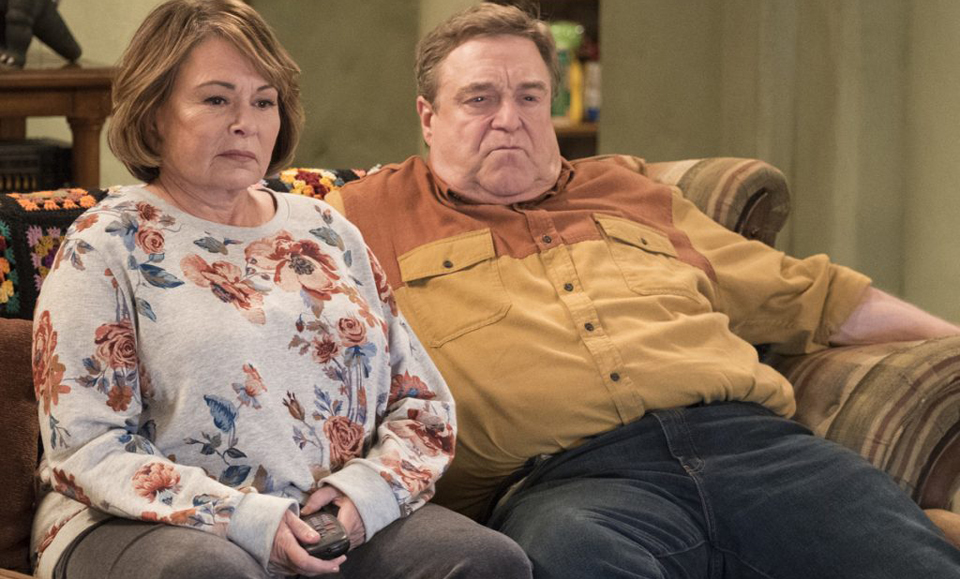
In response to a series of racist tweets ABC abruptly pulled the plug on the Roseanne reboot last week. After Roseanne Barr compared former Obama aide Valerie Jarrett to an ape and called billionaire George Soros a “Nazi” who “turned on his fellow Jews,” the broadcasting company decided they would no longer be airing any future episodes. Despite some attempts to backtrack on her remarks, Barr was told about the show’s cancellation just hours after consulting producer, Wanda Sykes, made an executive decision to quit.
Barr has a long history of inflammatory online remarks. Her behavior was far from unexpected and makes one wonder why exactly ABC chose to take a gamble on Roseanne in the first place. Barr’s own politics have flip flopped numerous times in the past; for a brief period she was extremely critical of the Israeli state, but by the time she was featured on Nightline in 2011 she had reverted back to staunchly Zionist views.
Additionally, during an interview addressing a controversial photoshoot Barr took for a satirical Jewish magazine, Barr is confronted about the nature of the images. The photographs, which were featured in an issue of Heeb magazine, depicted Barr dressed up as Hitler while putting human-shaped cookies in an oven. The publication drew much criticism, especially for the visual insinuation of Jews being “cooked” in gas ovens. When questioned about the distasteful nature of the photos during an interview, Barr responded, “no it was not Jews, it was Palestinians.”
This behavior is such a far fall from the working-class feminist icon that dominated the TV waves for years. When Roseanne first premiered on October 18, 1988, it was watched by 21.4 million households, making it the highest-rated debut of that season. During the nine-year run, from 1988 to 1997, Barr won an Emmy, a Golden Globe, a Kids Choice Award, and three American Comedy Awards for her part in the show. At one point, the leading actress was earning $40 million per season, making her the second-highest-paid woman in show business at the time, only after Oprah Winfrey.
Several factors contributed to Roseanne’s thriving success. One major part of the show’s appeal was the manner in which it resonated with working class families, and uplifted the image of a strong working-class woman. In a 2011 interview with NY Magazine Barr stated that when Roseanne first came out she “wanted to do a realistic show about a strong mother who was not a victim of patriarchal consumerist bulls*it.” She had a loyal following for nine seasons.
In March of 2018 devoted Roseanne fans came out in full support of the show’s revival. The Tuesday night premiere had 18.2 million viewers — making it the highest rated comedy episode on any broadcast network in nearly four years. Viewers were aching for the same authentic depiction of a working-class family that grappled with social, political and economic trife; a task that the original Roseanne masterfully addressed. Instead, they were presented with the misconstrued politics of a racist, transphobic, and zionist lead star. The show sought to preserve the misconceptions that fictional Roseanne, a white working-class woman, would maintain the same political interest as her real life persona — that of a rich white woman. Whereas the initial run of the show took time to deliberately paint an accurate portrait of the blue-collar family, the reboot resorted to lazy tropes and generic stereotypes of white working-class households.
Instead of exploring the nuanced and complicated dynamics of class politics, the Conners were pigeonholed into the role of Trump supporters. When asked about the creative decision to have Roseanne lean right, Barr defended her choice by saying that it was “just realistic” and that “it was working-class people who elected Trump.”
At the root of it, the Roseanne reboot was a disservice to its own fans. The creative direction it took in season 10 perpetuated the false notion that white working-class households ignorantly vote against their own self-interest. While many have argued that this is a reflection of our current political climate, exit polls have indicated that wealthy white voters were the ones who actually gave Donald Trump his electoral win.
Fictional Roseanne’s political leanings are much more a reflection of her real life politics than they are of the population she claims to represent. The millionaire comedian has had several positive public interactions online with Trump in the last several years – the president even tweeted Barr to congratulate her after the success of her reboot.
The portrayal of white working-class families as having no political consciousness is played out and lazy. It is the working class that experiences the brunt of Trump’s administrative policies and are stuck dealing with the legislative consequences of his cabinet. The GOP has pushed through anti-worker legislation that upholds unfair working conditions and weakens protections for workers in this country. History has shown us time and time again that it is the working class that mobilizes to challenge corporate entities and demands their right to unionize.
The media doesn’t often acknowledge the role that blue-collar workers take in our political movements — because it’s easier to pigeonhole them into classist caricatures of Trump supporters and racist. The men and women upholding the fabric of our workforce deserve better than the Roseanne reboot; they deserve to be recognized for the same political versatility that they are representative of in real life. We, as viewers, have an obligation to demand the types of stories that accurately capture the spirit and tenacity of our working class, with or without Roseanne.












Comments